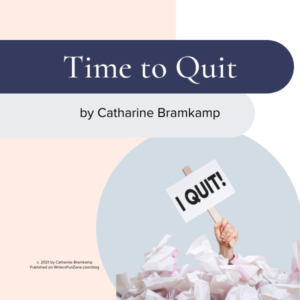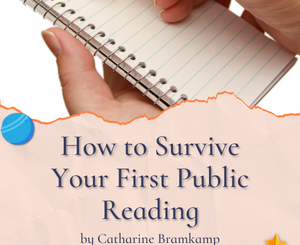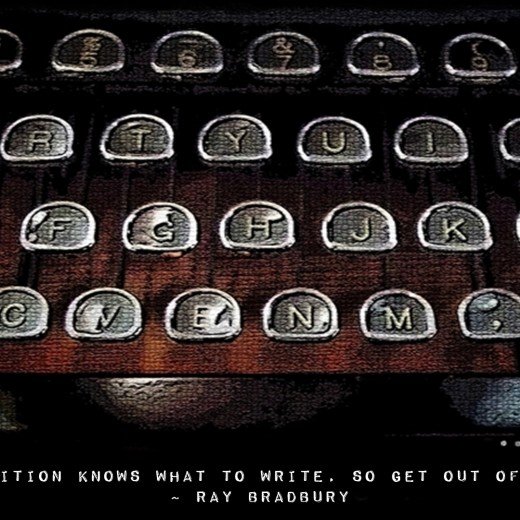Time to Quit by Catharine Bramkamp
 Let’s welcome back monthly columnist Catharine Bramkamp as she shares with us “Time to Quit.” Enjoy!
Let’s welcome back monthly columnist Catharine Bramkamp as she shares with us “Time to Quit.” Enjoy!
***
Are you slaving away at a project, like a novel, anthology, poetry collection, blog, newsletter, working at 100 miles per hour but making zero progress?
Maybe it’s time to quit.
I know, quitting is synonymous with failing. And failing is bad. That is the short version of very complex emotions that often come from our history (and likely our mothers).
Quitters never win, winners never quit.
There is a lot of baggage that weighs down the very idea of quitting that makes it difficult to even consider. But with the advent of business start ups and the popular mantra to “break things quickly,” quitting is having something of a renaissance.
The Quitting Renaissance
The first part of this renaissance is the Pivot. Rather than give up on a project completely, we steer a project in a different direction, or we evaluate a project and move forward on just one tantalizing piece of it.
That’s one kind of like quitting. But what about the real deal? Full on quitting. Dropping the offending project into the backwaters of a computer hard drive and moving on.
Our caution about quitting is both emotion and peer influenced.
We know the stories about writers who left a novel too soon and failed, and we know the stories of those who never quit and finally—after much excruciating effort—publish that damn manuscript. We know that the professional writer is the amateur who never quits.
But there are merits to both pivoting and just quitting.
Galley Slave Versus the Captain
You are the captain of your project.
You have the command, and you are in control. You can set whatever course is appropriate for the ship (your whole career).
If your current project isn’t heading in the right direction, it doesn’t take much to simply alter the course: The novel that isn’t flowing can be a series of short stories. Perhaps the short-story collection can be re-organized into blog posts.
The key point is that there is still potential in your project, and staying the course, even a modified one, is still worth the journey and effort.
But maybe you feel like a galley slave consigned to the dark bowels of the ship—rocking, sea sick, and miserable.
You’ve lost track of the destination because you can’t see where you’re going. The work is repetitive, mind numbing.
But the galley slave isn’t lazy, she is not sitting around the mess hall drinking stale coffee and complaining about her lot in life. She is working as hard as she can.
Yet she still makes little to no real progress.
Galley slaves start in good faith, but after a few weeks, they realize their mistake. The galley slave is on the wrong boat, headed to the wrong port.
Time to Quit and Jump Ship
That water is cold. How do we really know it’s time to jump?
While working away on this nowhere project do you:
- Check email every fifteen minutes as if it’s important?
- Postpone working on the project, day after day?
- Work on organizing your files for next year’s taxes?
- Run through your email in order to unsubscribe and file?
- Mow your neighbor’s lawn because you don’t have one?
- Watch the project deadline whoosh by with an astonishing lack of concern?
At the end of the day, are you drained or exhausted?
Exhaustion is being happily tired.
Exhausted writers have spent the day deeply involved in the zone. Your brain is so tired you can barely hold together a conversation thread. But you don’t care; it was a good day.
You gave it your all and now you are completely depleted. Marvelous!
Feeling drained is not like exhaustion.
At the end of the day, the drained writer isn’t even tired. A drained writer is, however, depressed, anxious, and depleted—and certainly frustrated.
Drained writers hunt for any project that carries more meaning than what they’ve been forced to do for the last 8 hours, like laundry. Lots of laundry
The writer wanders stiff-legged through the house searching for any laundry they can find, then they keep searching. They begin washing clean shirts!
Drained writers find it difficult to even sleep. They want to sleep since it’s a reprieve from the project, but they can’t because they are too worried about the project anyway.
Did you spend more time revising the project deadline, counting the remaining minutes you scheduled, than actually working on the project?
Work for five minutes. Clean the shower drain. Work for five minutes. Call mother. Work for five minutes. Search “restless” and “sleep problems” on web-MD.
If this is the case, galley slave, it’s time to quit.
The magic of quitting is that the act will free up space to welcome a new, better opportunity or project.
If you can’t find a way to pivot a project, that relentless negative energy will not only make the process excruciating, but it will negatively affect the finished project.
You may never be happy and the results may never be what you want.
Time to Quit, but How?
What if you can’t get off the boat?
- Artists crave meaning; it’s what we do. Can you find any meaning at all in your terrible, horrible, no-good project?
- Can you remember why you took on the project in the first place?
- Was there anything about the project that excited you?
- Can you return to that positive hopeful feeling?
- Is finishing this particular project helping move your career towards a larger goal?
- Are you getting paid?
- Will the activity itself contribute to being a better writer?
- Are you having fun?
A person does not end up as a writer.
We choose to be writers for many reasons but the best one is that we love the work.
But not even a deliberate career is all smooth sailing and happy porpoises, yet it’s also not endless deck swabbing and directionless wandering.
You are allowed—even required—to steer your own ship, and if the current direction is unbearable and leading to a destination you are no longer interested in, quit.
I’ll throw you a life preserver.
***
Want to read more articles like this one Writer’s Fun Zone? Subscribe here.
***
ABOUT THE AUTHOR
 Catharine Bramkamp is a successful writing coach, Chief Storytelling Officer, former co-producer of Newbie Writers Podcast, and author of a dozen books including the Real Estate Diva Mysteries series, and The Future Girls series. She holds two degrees in English and is an adjunct university professor. After fracturing her wrist, she has figured out there is very little she is able to do with one hand tied behind her back.
Catharine Bramkamp is a successful writing coach, Chief Storytelling Officer, former co-producer of Newbie Writers Podcast, and author of a dozen books including the Real Estate Diva Mysteries series, and The Future Girls series. She holds two degrees in English and is an adjunct university professor. After fracturing her wrist, she has figured out there is very little she is able to do with one hand tied behind her back.






